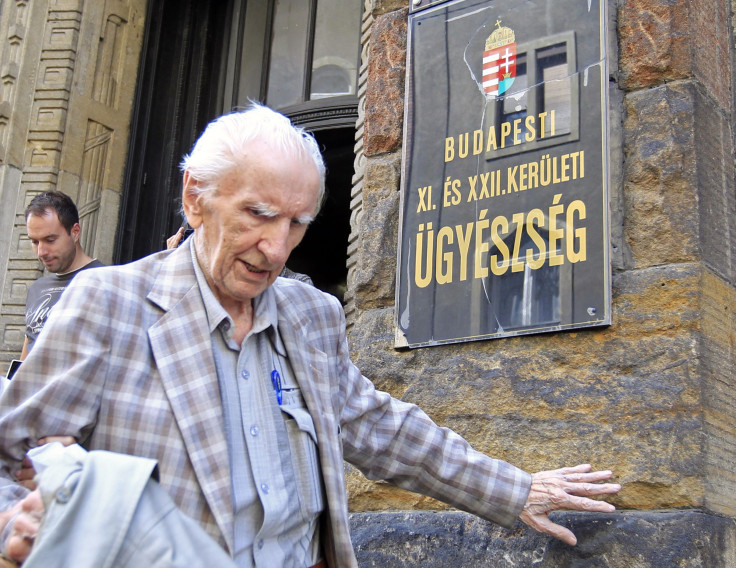Laszlo Csatary: War Criminal Charged In Hungary, But Time Is Running Out On Capturing Other Aging Nazis

Prosecutors in Hungary have charged a 98-year-old man named Laszlo Csatary over alleged war crimes committed during the Nazi era. The Simon Wiesenthal Center, which has been hunting Nazis for decades, said that Csatary served as a Nazi police officer and internment camp chief in 1944 in the town of Kosice -- which is now located in Slovakia -- and that he participated in the torture and mass murder of 15,700 Jews by supervising the deportation of Jews to the death camps in Auschwitz, which is now in Poland.
"With his actions, Laszlo Csatary ... deliberately provided help to the unlawful executions and torture committed against Jews deported to concentration camps ... from Kosice," the prosecutors' said in a statement said.
After the Germans occupied Hungary in 1944, Kosice (then called Kassa) became the first Jewish ghetto formed by the Nazis. Csatary, who faces trial within three months if he lives that long, has denied all the allegations and claims he only served as an intermediary between German and Hungarian officials in Kosice.
The Wiesenthal Center praised the development. "The indictment of Csatary 123 … is an important reminder that justice for the victims of the Holocaust can still be achieved,” said the center’s principal Nazi-hunter, Dr. Efraim Zuroff, in a statement.
“It is also a significant milestone for Hungary as the country struggles with its history during World War II, and sends an important message that people like Csatary are criminals rather than patriotic heroes. The Center urges the Hungarian authorities to expedite the trial in view of the defendant's advanced age."
As long ago as 1948, Csatary was condemned to death, in absentia, by a court in Czechoslovakia, the Peoples' Tribunal, for the torture and murder of Jews. But he had escaped to Canada under a false name after the war and was employed as an art dealer in Toronto and Montreal. After the Canadians revoked his citizenship in 1997, he seemed to have disappeared.
[The 1948 death sentence of the Tribunal, although still legally valid, is questioned now due to the heavy political influence wielded by the ruling Communist regime upon the judges.]
BBC reported that Csatary was located and identified in Budapest in July 2012 through the efforts of the Wiesenthal Center and The Sun newspaper of Britain. He was placed under house arrest. However, at the time of his arrest, some Hungarian researchers insisted that the case against Csatary was weak and that he was a rather minor character in the horrors of the Holocaust. "Csatary was a small fish. I could name 2,000 people responsible for worse crimes than he was," Laszlo Karsai, Hungary's most prominent Holocaust historian, told BBC. "The money spent hunting down people like him would be better spent fighting the propaganda of those who so energetically deny the Holocaust today."
In addition, so much time has passed since World War II, that eyewitnesses to crimes have become scarce, making it nearly impossible to conclusively establish the guilt of defendants. Suspected Nazi criminals are now in their late '80s or '90s. Indeed, in 2011, a court in Hungary found Sandor Kepiro, another apparent Hungarian war criminal, not guilty of committing crimes against Jews in Novi Sad, Serbia in 1942. Kepiro died soon after his acquittal.
In April 2012, the Wiesenthal Center listed its most wanted Nazi criminals, a list that comprised Csatary, as well as Alois Brunner, Klaas Carl Faber, Gerhard Sommer, Vladimir Katriuk, Karoly Zentai, Soeren Kam, Ivan Kalymon, Algimantas Dailide, Mikhail Gorshkow and Helmut Oberlander. Of this group, no one is younger than 88 (Oberlander), while the eldest (if he is still alive) is Brunner, who would now be 101 and was last seen residing in Syria. Brunner had served as a chief lieutenant to Adolf Eichmann and is the Center’s most wanted Nazi criminal. Some of these alleged war criminals have been acquitted by courts in various countries while others remain fugitives.
© Copyright IBTimes 2024. All rights reserved.





















